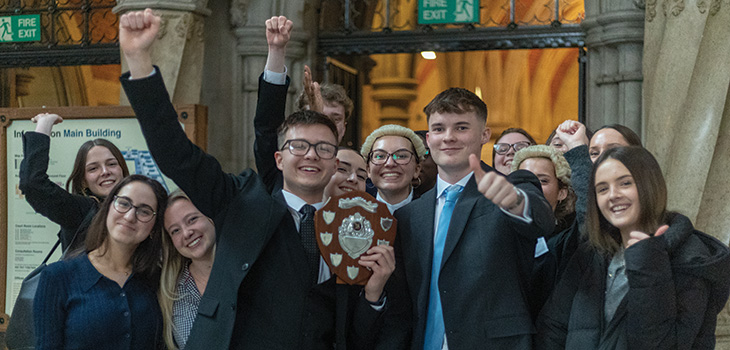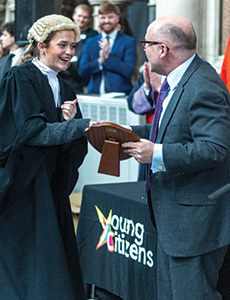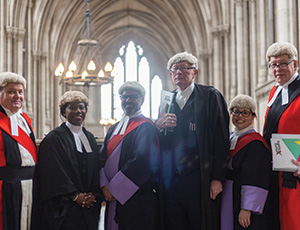*/

The legal profession has long been considered the preserve of the elite. Despite recent gains in social mobility, data suggests that diversity is still a problem.
The Bar Standards Board’s latest diversity report (2025) found that a disproportionate number of barristers (19.4%) attended a UK independent school. This compares to just 6.5% of all school children in England of any age currently enrolled at fee-paying schools.
I teach at a comprehensive school in Liverpool. Our students come from two of the three wards with the highest rate of child poverty in England. Many often have negative perceptions of their own city and suffer from a misconception that professions such as law are reserved for students from more privileged backgrounds.
Child poverty remains a huge obstacle in the way of our young people. With Bar training courses costing up to £20,220 (Prospects, 2024), it is no wonder that working-class pupils are put off from pursuing careers in law. Many students not only miss out on the luxury of financial safety nets, but also the social capital (and social networks) of wealthier families. Pupils feel invisible, as though their communities are not important or that they are not supposed to be successful.
The recent attack on diversity, equity and inclusion rippling over from the United States has been nothing short of disappointing. It defies the evidence that diversity wins, both in the business case (McKinsey, 2020) and the self-evident moral argument. I believe we can redress the balance by providing accessible opportunities for legal education and inspiring experiences that change young people’s perceptions of what they can do.
Each year, thousands of state school students make the leap from classroom to courtrooms as part of the national Bar Mock Trial Competition, organised by the education charity Young Citizens. Teams of pupils aged 15 to 18 take part in mock criminal trials, becoming barristers, clerks, witnesses and defendants for the day, with performances assessed by real judges.
Our school, Cardinal Heenan Catholic High School, fielded a team in 2023. The cases may be fictional, but the benefits for students are very real. On the day of the competition at Liverpool Crown Court, despite all the hard work and preparation, many pupils were very nervous and admitted to feeling like imposters. But the nerves were soon replaced with an exhilarating recognition that they deserved to be there, competing against many outstanding grammar schools.
I took part in the competition myself at the High Court in Belfast in 1999. Coming from an underprivileged, single-parent family, I remember the pride of representing my school as a barrister. That feeling was nothing compared to the pride I felt some 24 years later seeing my pupils take part.
One of our students, Sonny, also took on the role of a barrister. He had special learning difficulties and a stammer, making public speaking challenging, but overcame this to stand up bravely in court:
‘Being able to advocate in front of a fully qualified judge and receive feedback from someone with such experience was beyond my wildest dreams at the time. It gave me confidence in everything I was doing, including university applications and networking in social situations.’
I am thrilled to say that Sonny is now reading law at Keble College, Oxford.
With the new hostile approach to DEI (diversity, equality and inclusion) becoming evident across the pond, we need to redouble our commitment to accessibility and social mobility. Providing pupils from low-income families with meaningful, funded learning experiences can raise aspirations and level the playing field.
I hope the leaders of the UK will think twice before ditching their commitments to DEI or youth initiatives. Support from not just the government but today’s leading firms and professionals can ensure that every young person realises their potential, regardless of their starting point. Let’s see how our very own British approach can be a beacon for what inclusion can really achieve.
My first introduction to the Bar Mock Trial Competition was as a teacher. Newly qualified through Teach First, and with a law degree under my belt, the head of politics urged me to coordinate our school’s nervy but enthusiastic team. Who could have predicted that, a few years later, I would find myself embedding public legal education into hundreds of state schools through the programme with Young Citizens?
Founded in 1991,* the Bar Mock Trial Competition has supported tens of thousands of state school students aged 15 to 18 to develop skills, knowledge and confidence. This year, over 3,000 students from 214 schools across all four nations of the UK took part. (Our sister competition for 12-to-14-year-olds, the Magistrates’ Court Mock Trial Competition, welcomes just as many students each year.)
After progressing to the national final at the Royal Courts of Justice in March, The Boswells School in Essex was crowned champion, with prizes presented by the Attorney General, Lord Hermer KC. Gabriella, 18, a student at the school, said:
‘The competition has allowed me to gain so many skills that will be useful later in life. Being able to present a case in a real courtroom has confirmed that I want to be a barrister.’
Whether they want to pursue careers in law or not, the competition is a massive boost for students in traditionally underserved postcodes: 92% have a better understanding of their legal rights and responsibilities, while 88.5% have more confidence in thinking through complex issues and legal disputes.
What makes the competition extra special for young people is being able to interact with practising legal professionals. Each year the competition relies on the generous support of over 400 volunteers from the legal profession. One of our most loyal is Sophie Stevens, a dyslexic barrister at 9BR Chambers who co-founded the charity Neurodiversity in Law in 2023. She frequently offers her time as a judge, mentor, speaker and event facilitator:
‘It is so important for those with neurodivergent conditions and from underrepresented backgrounds to get opportunities like this. Seeing students being able to practice advocacy with the support of professionals is incredible. I never did anything like this during school. I am sure it would have given me a strong grounding in essential skills such as analysis, public speaking and critical thinking.
‘As barristers, we need to be visible to young people. The more we interact with students and share our stories, the more likely they are to trust our legal system and want to be part of it.’
This year, Young Citizens wants to recruit even more barristers to deliver a comprehensive package of mentorship for state school pupils. If you would like to get involved, see here or email: barmocktrials@youngcitizens.org
* Founded in 1991 by Young Citizens, the Bar Mock Trial Competition is supported by The Bar Council of England and Wales, The Faculty of Advocates, The Bar of Northern Ireland, the Inns of Court and the Circuits. Find out more here.



The legal profession has long been considered the preserve of the elite. Despite recent gains in social mobility, data suggests that diversity is still a problem.
The Bar Standards Board’s latest diversity report (2025) found that a disproportionate number of barristers (19.4%) attended a UK independent school. This compares to just 6.5% of all school children in England of any age currently enrolled at fee-paying schools.
I teach at a comprehensive school in Liverpool. Our students come from two of the three wards with the highest rate of child poverty in England. Many often have negative perceptions of their own city and suffer from a misconception that professions such as law are reserved for students from more privileged backgrounds.
Child poverty remains a huge obstacle in the way of our young people. With Bar training courses costing up to £20,220 (Prospects, 2024), it is no wonder that working-class pupils are put off from pursuing careers in law. Many students not only miss out on the luxury of financial safety nets, but also the social capital (and social networks) of wealthier families. Pupils feel invisible, as though their communities are not important or that they are not supposed to be successful.
The recent attack on diversity, equity and inclusion rippling over from the United States has been nothing short of disappointing. It defies the evidence that diversity wins, both in the business case (McKinsey, 2020) and the self-evident moral argument. I believe we can redress the balance by providing accessible opportunities for legal education and inspiring experiences that change young people’s perceptions of what they can do.
Each year, thousands of state school students make the leap from classroom to courtrooms as part of the national Bar Mock Trial Competition, organised by the education charity Young Citizens. Teams of pupils aged 15 to 18 take part in mock criminal trials, becoming barristers, clerks, witnesses and defendants for the day, with performances assessed by real judges.
Our school, Cardinal Heenan Catholic High School, fielded a team in 2023. The cases may be fictional, but the benefits for students are very real. On the day of the competition at Liverpool Crown Court, despite all the hard work and preparation, many pupils were very nervous and admitted to feeling like imposters. But the nerves were soon replaced with an exhilarating recognition that they deserved to be there, competing against many outstanding grammar schools.
I took part in the competition myself at the High Court in Belfast in 1999. Coming from an underprivileged, single-parent family, I remember the pride of representing my school as a barrister. That feeling was nothing compared to the pride I felt some 24 years later seeing my pupils take part.
One of our students, Sonny, also took on the role of a barrister. He had special learning difficulties and a stammer, making public speaking challenging, but overcame this to stand up bravely in court:
‘Being able to advocate in front of a fully qualified judge and receive feedback from someone with such experience was beyond my wildest dreams at the time. It gave me confidence in everything I was doing, including university applications and networking in social situations.’
I am thrilled to say that Sonny is now reading law at Keble College, Oxford.
With the new hostile approach to DEI (diversity, equality and inclusion) becoming evident across the pond, we need to redouble our commitment to accessibility and social mobility. Providing pupils from low-income families with meaningful, funded learning experiences can raise aspirations and level the playing field.
I hope the leaders of the UK will think twice before ditching their commitments to DEI or youth initiatives. Support from not just the government but today’s leading firms and professionals can ensure that every young person realises their potential, regardless of their starting point. Let’s see how our very own British approach can be a beacon for what inclusion can really achieve.
My first introduction to the Bar Mock Trial Competition was as a teacher. Newly qualified through Teach First, and with a law degree under my belt, the head of politics urged me to coordinate our school’s nervy but enthusiastic team. Who could have predicted that, a few years later, I would find myself embedding public legal education into hundreds of state schools through the programme with Young Citizens?
Founded in 1991,* the Bar Mock Trial Competition has supported tens of thousands of state school students aged 15 to 18 to develop skills, knowledge and confidence. This year, over 3,000 students from 214 schools across all four nations of the UK took part. (Our sister competition for 12-to-14-year-olds, the Magistrates’ Court Mock Trial Competition, welcomes just as many students each year.)
After progressing to the national final at the Royal Courts of Justice in March, The Boswells School in Essex was crowned champion, with prizes presented by the Attorney General, Lord Hermer KC. Gabriella, 18, a student at the school, said:
‘The competition has allowed me to gain so many skills that will be useful later in life. Being able to present a case in a real courtroom has confirmed that I want to be a barrister.’
Whether they want to pursue careers in law or not, the competition is a massive boost for students in traditionally underserved postcodes: 92% have a better understanding of their legal rights and responsibilities, while 88.5% have more confidence in thinking through complex issues and legal disputes.
What makes the competition extra special for young people is being able to interact with practising legal professionals. Each year the competition relies on the generous support of over 400 volunteers from the legal profession. One of our most loyal is Sophie Stevens, a dyslexic barrister at 9BR Chambers who co-founded the charity Neurodiversity in Law in 2023. She frequently offers her time as a judge, mentor, speaker and event facilitator:
‘It is so important for those with neurodivergent conditions and from underrepresented backgrounds to get opportunities like this. Seeing students being able to practice advocacy with the support of professionals is incredible. I never did anything like this during school. I am sure it would have given me a strong grounding in essential skills such as analysis, public speaking and critical thinking.
‘As barristers, we need to be visible to young people. The more we interact with students and share our stories, the more likely they are to trust our legal system and want to be part of it.’
This year, Young Citizens wants to recruit even more barristers to deliver a comprehensive package of mentorship for state school pupils. If you would like to get involved, see here or email: barmocktrials@youngcitizens.org
* Founded in 1991 by Young Citizens, the Bar Mock Trial Competition is supported by The Bar Council of England and Wales, The Faculty of Advocates, The Bar of Northern Ireland, the Inns of Court and the Circuits. Find out more here.




The Bar Council is ready to support a turn to the efficiencies that will make a difference
By Louise Crush of Westgate Wealth Management
Marie Law, Director of Toxicology at AlphaBiolabs, examines the latest ONS data on drug misuse and its implications for toxicology testing in family law cases
An interview with Rob Wagg, CEO of New Park Court Chambers
What meaningful steps can you take in 2026 to advance your legal career? asks Thomas Cowan of St Pauls Chambers
Marie Law, Director of Toxicology at AlphaBiolabs, explains why drugs may appear in test results, despite the donor denying use of them
Ever wondered what a pupillage is like at the CPS? This Q and A provides an insight into the training, experience and next steps
The appointments of 96 new King’s Counsel (also known as silk) are announced today
Ready for the new way to do tax returns? David Southern KC continues his series explaining the impact on barristers. In part 2, a worked example shows the specific practicalities of adapting to the new system
Resolution of the criminal justice crisis does not lie in reheating old ideas that have been roundly rejected before, say Ed Vickers KC, Faras Baloch and Katie Bacon
With pupillage application season under way, Laura Wright reflects on her route to ‘tech barrister’ and offers advice for those aiming at a career at the Bar